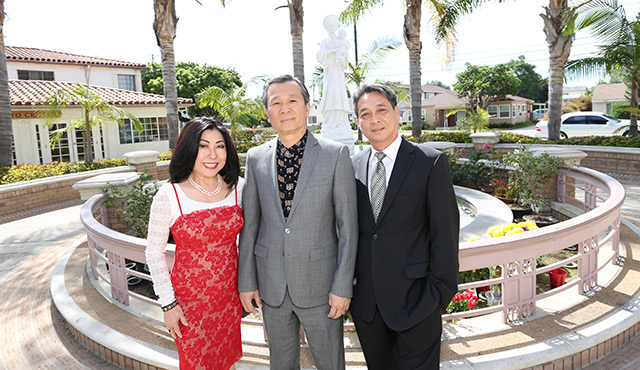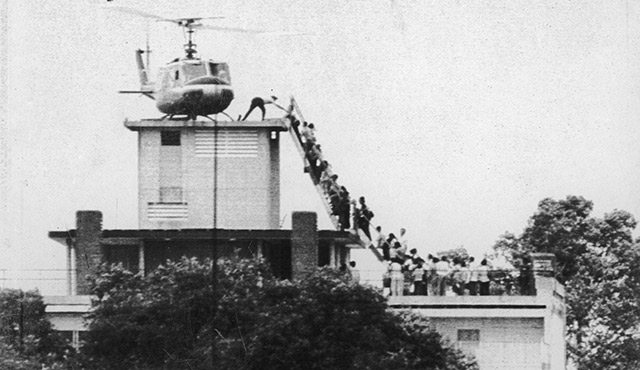Web Editor’s Note: OC Catholic Editor Patrick Mott interviewed Minh Van Phan and Rose Phan on OC Catholic Radio. Click here to listen.
Forty years ago, as millions of Americans stared into their televisions sets with a mix of leaden sadness, weary resignation and anxiety, watching the indelible images of terrified Vietnamese people fleeing ahead of communist forces rumbling into Saigon, Rose and Minh Van Phan and Tri Ma Gia were in terrible trouble.
Rose, a budding pianist, Minh, a former seminary student and Tri, a young lawyer and rising community leader, were about to become hunted refugees, beginning separate harrowing journeys that would eventually take them to a new and vastly different life in Orange County.
Today, the three devoted Catholics, all parishioners within the Diocese of Orange, look back on that time with complex emotions of sadness, hope and gratitude, recalling moments of terror, days and weeks of gnawing uncertainty, and the problems and exhilaration that came with making a new home and life for themselves half a world away in Southern California.
MINH VAN PHAN
Burned into the memory of Minh Van Phan is a scene outside his family’s home in central Vietnam in 1963. Because his was the only Catholic family in the area, says Minh, communist soldiers infiltrating from the north stormed into his house and forced the family to watch as they executed Minh’s father.
“It happened right in front of me when I was 7 years old,” says Minh. “The communists came down from the mountains at night. They surrounded my house and took my father and tied him down and killed him. My mother had just given birth to my youngest brother the week before. The next day, they threatened to kill the whole family. So my mom and my two younger brothers and my young sister left that place.”
Minh clung to his faith, entering a seminary in Vietnam operated by the Lasan Christian Brothers in 1967. He intended to join their ranks as a brother. But with communist military forces pushing farther and farther south as the Vietnam War wore on, the seminary was in danger of being overrun, and Minh was forced to leave and rejoin his family.
When the communist forces began to approach the capital of South Vietnam, Minh was forced to flee once again. He was one of the luckier citizens living in the Saigon area: his sister worked for the U.S. Consulate and it was arranged for him and his family to be airlifted to Guam on April 25, 1975—just ahead of the North Vietnamese communist forces that entered Saigon five days later. They left with nothing but the clothes they were wearing. They spent only 10 days on the island before they were transferred to the growing refugee settlement at Camp Pendleton.
Minh, his mother, brothers and sisters—seven in all—spent four months on the Marine base living in a tent.
“We cleaned off a place in the field to put a tent up in this grass field in a valley, and it was my first experience with real cold,” says Minh. “I mean, it was freezing cold at night. The whole family was shaking in the cold.”
When a Catholic parish in Covina offered to sponsor the Phans, the family moved to that city and Minh found a janitorial job with the local school district.
“I cleaned toilets for the local school district,” he says. “I would clean toilets in all those restrooms and I’d cry and say that I’d never do this again if I didn’t have to.” Six months later he began a job assembling lawn sprinklers and later became a machinist for the same company, working during the day and earning an engineering degree at night.
Minh Van Phan was on his way up.
ROSE PHAN
At age 17, Rose Phan was attending a French Catholic school in Saigon when North Vietnamese tanks began to clank into the suburbs.
“They just walked in, and it was chaos,” she says. We didn’t know how to get out. We didn’t know anything. Our whole family really didn’t understand what communism was about.”
When the city fell on April 30, her family stayed on, “but everything in our life stopped. The future seemed to be ending.” Her father was denounced for trying to arrange an escape by boat. He was turned in to the communist authorities, imprisoned and tortured. “We didn’t know where he was taken,” says Rose. “He was put on a public trial. It was horrible. He was forced to write a confession every day he was in jail.”
Eventually, her father was returned to the family, and bought time by allowing the communists to plunder family possessions at will. Meanwhile, he planned another escape.
In June, 1976, “after a year under the communists, we left from a very small river, and at that time nobody dared to think about escaping that way,” says Rose. “They’d leave by sea in fishing boats. We just had a very small boat.”
Rose, her four siblings and her mother and father transferred to larger boats as the river neared the ocean. Still, once they reached the sea they were still passengers on a boat that was too small to be truly seaworthy.
“After a few days,” she says, “we actually ran out of water. But we prayed for water and got a storm. After that, though, we ran out of gasoline and just drifted helplessly.”
Days later they were picked up by a communist gunboat and taken on board with their little boat in tow. Once again, her father stepped up and stealthily organized a takeover of the gunboat.
“He managed to take over the boat with some other brave people,” says Rose. “He said, ‘Either we live or we die, but we’re not going to go back.’ My father was a hero. There were bullets flying everywhere, and it all happened so fast.”
Here sister was grazed by a bullet and still bears a scar near her eyebrow.
The group eventually was met at sea by a Thai fishing boat that escorted them to Thailand and a refugee camp, where they remained for two months. The family arrived in California on August 2. Sponsored by an aunt who was living in Southern California, Rose and her family moved into a house in Mission Viejo.
Rose returned to school to study piano and worked as a janitor, as did her parents. Later, the family worked at basic electronic assembly subcontracting work at their home and Rose got a job as a piano teacher, and played the organ for Masses at Mission San Juan Capistrano. She also became the first court interpreter in Orange County specializing in Vietnamese interpretation.
While studying at UCLA in 1979, Rose had a Vietnamese roommate who had a brother who came to borrow books one day. They began seeing each other. She and Minh Van Phan were married in 1984 and had three sons.
The couple started a computer business in 1989, won a government contract to upgrade computers at low cost, then sold the business to concentrate on designing video surveillance equipment. They sold that business in 2005 when Minh invented PumpTop TV technology—small video screens mounted on the top of pumps at gas stations. In 2014 the Phans, who live in Laguna Hills and attend St. Nicholas Church there, created BellaVie Network, an online shopping network designed to fund community-based charities.
Now retired, Minh was recently accepted into the diaconate program for the Diocese of Orange. “I’m dedicating the rest of my life to the Church,” he says.
“Ever since our escape, I know that every second I’m being watched and protected by God,” says Rose. “I look back on that time often, rewinding, reviewing, learning from what has happened. We’re grateful to America for taking us in and giving us a second chance at life. Every step has been a miracle.”
TRI MA GIA
As a young lawyer with political ambitions, educated by the Jesuits and the Redemptorists, Tri Ma Gia was highly visible in Saigon in the spring of 1975. He was 25 and chief of staff in the Ministry of Education.
Much of that life came to an end, however, as communist forces drew near. Recognizing that he would be a marked man, Tri managed to secure a spot on a small boat heading downriver to the ocean with a cargo of refugees. The boat came under fire on several occasions, and the situation became particularly terrifying at night, he says.
“Bullets were flying all over the place,” he says. “I sat on top of the boat and prayed. The bullets were everywhere, but we got through OK.”
The refugees who wanted to go on—some balked and turned back—transferred to another boat to venture into the ocean. Navigation was difficult, and at one point it was discovered that the boat was headed back to shore.
“Everyone was going crazy,” remembers Tri. “We heard on the radio that Saigon had fallen. We knew then we couldn’t go back. We saw a lot of boats, but nobody would take us. I just slept and prayed and told God it was in his hands. Two days later an American aircraft carrier picked us up.
“I hadn’t eaten anything for three days, but the first thing I did on the carrier was to find a priest and organize a Mass of thanksgiving for the people. That Communion host was so delicious!”
After initial processing in Guam, Tri’s first port of entry into the U.S. was Harrisburg, Penn. “They had a whole escort for us with Jeeps when we arrived,” he says. “I saw people waving. I felt so happy, so joyful. It was such a warm welcome, it choked me up.”
His wife, who had fled Vietnam using her diplomatic passport the month before the fall of Saigon, was in Taiwan. A Christian couple offered to sponsor Tri and his wife, and the pair were reunited in Sommerville, N.J. The pair both got jobs in New York City. Tri worked at a bank, went to college and earned an MBA degree.
Today Tri is affiliated with both Our Lady of La Vang Church and Holy Spirit Church, and is heavily involved in several ministries in the Diocese of Orange and in the local Vietnamese professional and business community. He works as an advocate for the insurance industry, providing assistance and counsel on subjects such as Medicare, Social Security, medical insurance and retirement, “recommending the right solutions.”
“God has used me as an instrument to help a lot of people,” he says.


